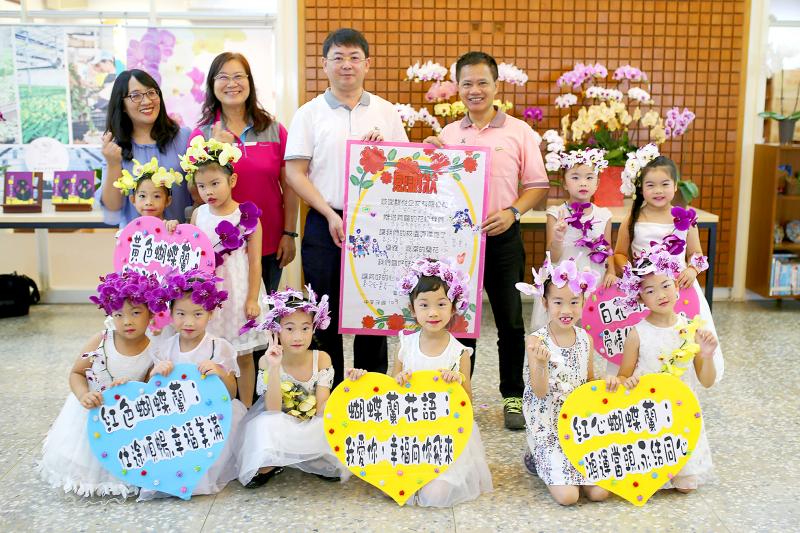The number of spectators allowed at CPBL baseball games is to be raised to 2,000 from today, the Central Epidemic Command Center (CECC) said yesterday, as it reported no new cases of COVID-19 for the seventh consecutive day.
While fans would not be able to bring their own snacks into stadiums, the center is allowing league-prepared lunchboxes, which would also contain disinfectant products, Deputy Minister of the Interior Chen Tsung-yen (陳宗彥), who is deputy head of the center, said at the daily CECC media briefing in Taipei.
In a world first, the league on Friday last week opened stadiums to a maximum of 1,000 spectators per game under approval from the CECC.

Photo: Chen Chi-chu, Taipei Times
Fans are assigned staggered seats, required to wear masks and prohibited from eating, although water is allowed. Their temperatures are taken and their hands sprayed with disinfectant before they can enter the stadiums.
The CPBL was also the first professional baseball league in the world to start its new season, opening on April 12.
American Institute in Taiwan (AIT) Director Brent Christensen reportedly suggested that the league change its name by dropping the “Chinese” in Chinese Professional Baseball League and using “Taiwan,” so that foreigners would not mistake it as a China-based entity.

Photo: Chiu Chih-ju, Taipei Times
The AIT respects that the league’s name has been used for 31 years, but suggested that it increase the use of “Taiwan” in its English-language promotional materials, the league said in a statement on Saturday last week.
As of yesterday, Taiwan had recorded 440 confirmed cases of COVID-19 — 349 imported infections, 55 local and 36 from the navy’s “Friendship Flotilla” — while its death toll from COVID-19 stood at seven, center data showed.
Among people with confirmed cases, 383 have been released from isolation, up from 375 on Wednesday, the center said.
No new cases were reported by the center yesterday, for a seventh straight day. It has been 32 days since the last confirmed local case.
Regarding long-distance fishing vessels expected to return to Taiwan late this month, the center had initially planned to allow crew members to disembark and forgo the 14-day isolation period if they had not had contact with a foreign port over the past 30 days.
However, after a meeting with the Fisheries Agency and some local governments a week or two ago, experts felt that the health of crew members could not be ensured, so a 14-day isolation period would still be required, Chen said.
Later yesterday, the center and the Fisheries Agency were scheduled to meet to discuss financial concerns expressed by fishing companies, he said.
The center is preparing a report on Taiwan’s experiences in fighting COVID-19, to be shared with the world, said Minister of Health and Welfare Chen Shih-chung (陳時中), who heads the center.
The report is to include information on the center’s decisionmaking process, communications with the public, testing strategies and case investigations, he said.
Additional reporting by CNA

The US government has signed defense cooperation agreements with Japan and the Philippines to boost the deterrence capabilities of countries in the first island chain, a report by the National Security Bureau (NSB) showed. The main countries on the first island chain include the two nations and Taiwan. The bureau is to present the report at a meeting of the legislature’s Foreign Affairs and National Defense Committee tomorrow. The US military has deployed Typhon missile systems to Japan’s Yamaguchi Prefecture and Zambales province in the Philippines during their joint military exercises. It has also installed NMESIS anti-ship systems in Japan’s Okinawa

TRAGEDY STRIKES TAIPEI: The suspect died after falling off a building after he threw smoke grenades into Taipei Main Station and went on a killing spree in Zhongshan A 27-year-old suspect allegedly threw smoke grenades in Taipei Main Station and then proceeded to Zhongshan MRT Station in a random killing spree that resulted in the death of the suspect and two other civilians, and seven injured, including one in critical condition, as of press time last night. The suspect, identified as a man surnamed Chang Wen (張文), allegedly began the attack at Taipei Main Station, the Taipei Fire Department said, adding that it received a report at 5:24pm that smoke grenades had been thrown in the station. One man in his 50s was rushed to hospital after a cardiac arrest

ON ALERT: Taiwan’s partners would issue warnings if China attempted to use Interpol to target Taiwanese, and the global body has mechanisms to prevent it, an official said China has stationed two to four people specializing in Taiwan affairs at its embassies in several democratic countries to monitor and harass Taiwanese, actions that the host nations would not tolerate, National Security Bureau (NSB) Director-General Tsai Ming-yen (蔡明彥) said yesterday. Tsai made the comments at a meeting of the legislature’s Foreign Affairs and National Defense Committee, which asked him and Minister of National Defense Wellington Koo (顧立雄) to report on potential conflicts in the Taiwan Strait and military preparedness. Democratic Progressive Party (DPP) Legislator Michelle Lin (林楚茵) expressed concern that Beijing has posted personnel from China’s Taiwan Affairs Office to its

PUBLIC SAFETY: The premier said that security would be tightened in transport hubs, while President Lai commended the public for their bravery The government is to deploy more police, including rapid response units, in crowded public areas to ensure a swift response to any threats, President William Lai (賴清德) said yesterday after a knife attack killed three people and injured 11 in Taipei the previous day. Lai made the remarks following a briefing by the National Police Agency on the progress of the investigation, saying that the attack underscored the importance of cooperation in public security between the central and local governments. The attack unfolded in the early evening on Friday around Taipei Main Station’s M7 exit and later near the Taipei MRT’s Zhongshan